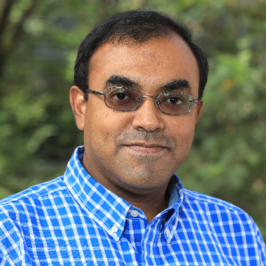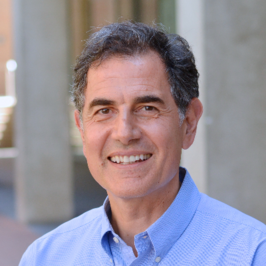The Riverside Artificial Intelligence Research (RAISE) Institute, a new interdisciplinary research center at UC Riverside (UCR), was established to elevate the university's national and international profile, aligning with a top priority of UCR's strategic vision for 2030. RAISE is the first campus interdisciplinary research center funded by an initiative from the Office of the Provost and the Office of Research and Economic Development. It was selected through an internal competition that attracted multiple highly competitive proposals.
With artificial intelligence (AI) research and applications evolving rapidly and impacting our daily lives, faculty from UCR’s Marlan and Rosemary Bourns College of Engineering (BCOE) are leading efforts in this powerful and transformative technology. Professor and Bourns Family Faculty Fellow Amit Roy-Chowdhury, from the Department of Electrical and Computer Engineering, and Professor Vassilis Tsotras, from the Department of Computer Science and Engineering, will co-direct the new institute.
AI discoveries are revolutionizing various aspects of life. While public attention often focuses on industry advancements like ChatGPT and DALL·E, these breakthroughs are grounded in academic research. RAISE aims to integrate foundational AI research with practical applications across a wide range of fields.
The institute will bring together ongoing collaborations, external funding efforts, and intellectual property development initiatives across campus, supporting AI research in diverse fields such as machine learning, natural language processing, computer vision, robotics, cybersecurity, bioinformatics, and social sciences.
"RAISE represents a significant step in unifying our AI research efforts," said Roy-Chowdhury. "We are committed to advancing both the theoretical foundations and practical applications of AI to benefit society."
Over 85 faculty members from all seven of UCR’s schools and colleges — 10 percent of the university’s total faculty — will participate in RAISE. The collaboration among these researchers will help position UCR and BCOE at the forefront of AI research, education, and applications.
Co-directors Roy-Chowdhury and Tsotras bring a strong track record of research, curriculum and program development, and co-curricular activities fundamentally tied to AI discovery and advancements.
Roy-Chowdhury, chair of BCOE’s Robotics program and former director of the Center for Robotics and Intelligence Systems, leads the Video Computing Group, which focuses on foundational principles of computer vision, image processing, and statistical learning, with applications in cyber-physical, autonomous, and intelligent systems.
Tsotras, the director of BCOE’s Master of Science in Computational Data Science program and co-chair of the Data Science undergraduate program, recently helped launch the master's program to meet the nation’s ever-growing demand for skilled data scientists and analysts. His research interests include big data management, spatio-temporal databases, and hardware acceleration of database operations.
The RAISE Institute is not just about AI research—it's about AI impact.
"RAISE is also about educating individuals to navigate the ethical considerations and societal impact of AI, ensuring a responsible and knowledgeable integration of this powerful tool into our future," said Tsotras.
The institute will focus on AI education and developing coursework and programs to train students and faculty in the latest AI technologies. A distinguished team of faculty members will be dedicated to creating introductory AI courses and exploring the ethical considerations associated with AI system development and application. Efforts will also concentrate on integrating AI education and ethics into the curriculum, ensuring UCR’s continued leadership in social mobility and research impact.
About the Marlan and Rosemary Bourns College of Engineering at UC Riverside:
The Marlan and Rosemary Bourns College of Engineering at UC Riverside is committed to excellence in research and education across a broad range of disciplines in engineering and computing disciplines. Despite its relatively short 30-year history, it has achieved the research profile of a well-established engineering college. The diversity of the student body is a key strength of the college, which offers doctoral, master's, and undergraduate programs in engineering and computer science. These programs emphasize a balance between theory and practice. Students gain expertise by applying theoretical concepts in cutting-edge laboratories. The college also provides various opportunities for double majors, minors, study abroad, research, and internships, with undergraduate research as a defining feature.
Header image created with the assistance of DALL·E 2.

